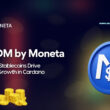Governance is one of the main pillars in the design of Cardano, according to the vision of Charles Hoskinson, its founder.
Blockchain governance implies decentralization, if all change is decided by democratic consensus.
Currently, and like all development in its early days, there is no governance of the Cardano community, because it is very difficult to coordinate progress. Even Bitcoin, the blockchain of which its community affirms that it “does not have a CEO”, in its beginnings it was centralized, since its developer, Satoshi Nakamoto, was (were they?) the one who designed and coded it, and was even the first miner .
Voltaire is the Age of Governance, and had its first milestone in September 2020 with the launch of Project Catalyst FUND 1, an ongoing experiment, which aims for decentralized innovation and collaboration, within a blockchain ecosystem, supporting community developments with community voting, distributing money from the Cardano Treasury. My article: The Beginning of Cardano’s Governance: Project Catalyst
Recently, the IOHK team added a new improvement proposal to evolve governance with a simple and transient design, The existing governance mechanism, which was introduced in the Shelley Era ledger, is capable of modifying parameter values of the protocol, including the initiation of Hard Forks, and the transfer of ADA from reserves and treasury, and that is where this proposal points. My article: A CIP for a Decentralized Governance Mechanism for the Voltaire Era.
There are two blockchain voting methods, let’s see.
Off-chain and On-chain Governance
The first blockchain protocols, such as Bitcoin and Ethereum, have a fairly spontaneous and little-institutionalized social consensus process, which occurs off-chain. Decisions about changes to the protocol are agreed between the developers, and approved by the miners (validator pools in Ethereum, today) to be implemented. This process is done informally, without network methods.
In the off-chain governance of traditional models, any developer can submit an improvement proposal to the community, called pull requests.
Several more recent blockchain projects have introduced alternative proposals on how to mitigate these process shortcomings with various on-chain governance models, where decisions are regulated and enforced, at least partially, at the protocol level.
On-chain governance involves complex mechanisms, usually holding a certain token, which gives its owners the ability to make decisions.
On-chain governance refers to mechanisms that allow developers to spread their improvement proposal on-chain, so that it can be put to a vote. After approval, the improvement is deployed on the test network for a certain time, and then, if there are no bugs, it is executed on the main network.
On-chain governance solutions can increase coordination and fairness, but they are also risky, as they are more difficult to change once instituted, and could be more easily exploited.
Off-chain governance solutions are more likely to be centralized, since certain participants control the process, and this can ‘tempt’ manipulation, as they are less transparent than on-chain processes. Presumably a certain degree of coordination within the chain facilitates the efficiency of action in general, but it does not solve the human factor.
The on-chain and off-chain models have advantages and disadvantages, and the suitability of each of them will depend on the scalability of the blockchain, the governance model, and the ecosystem in which it is used. In some cases, currently, a combination of both approaches may be adequate to resolve the decision-making process.
Democratic governance is not possible without voting. In Cardano, different voting systems are beginning to be developed, both off-chain and on-chain. Let’s see the most important ones, two off-chain and four on-chain.
Project Catalyst
In the case of the Cardano Project Catalyst, any ADA holder, with a minimum of ₳500 in each wallet (as of the date of writing this article), can register each one, using one of the many enabled wallet applications, and then vote online with the Catalyst DApp. However, scrutiny is offline. Although it cannot be considered an online voting system, we could more precisely say that it is a hybrid system.
SundaeSwap Governance
The team defines the governance system as a layer 2 solution for Cardano-based projects, offering this platform as a service.
The implementation at the launch of the DEX was not possible, due to Cardano’s current transaction size parameters.
Governance capabilities in SundaeSwap Protocol smart contracts require transactions larger than 16KB, partly due to the requirement that the script be included in each transaction. The team expects the parameters to increase over time, and until then has created a governance platform called “Sundae DAO” on Discord to discuss governance proposals:SundaeSwap Community.
Any critical decisions that are addressed in the near term may be subject to an informal community vote, similar to how the community voted in December 2021 to select the initial Stakepool Operators to serve as Scoopers.
The government model employs Merkle trees as a means of verifying data, without writing all the data to the Cardano blockchain.
Each voter had to register on a voting form, and manifest their choice by sending to themselves, to their own wallet, a small amount of ADA that identified, according to the amount, who was voted, that is, that they voted with a transaction. Thus, the vote was registered online, and attested to the election, however the scrutiny was offline. Although it cannot be considered an online voting system, it is an off-chain system, again we could say more precisely, that it is a hybrid system.
In addition to the Discord platform, a Proposals, Temperature Check and DAO Discussion forum was created: SundaeSwap Governance.
This governance approach is an initial and interim solution for voting on community proposals for light protocol proposals.
Members can vote on a proposal by linking a wallet to the Government Portal, as long as it contains a minimum amount of 2,000 SUNDAE.
SPOCRA
SPOCRA (Stake Pool Operator Collective Representation Assembly), was created in September 2020 as an organization, in response to Charles Hoskinson’s suggestion that Stakepool Operators form a guild to represent their ideas and suggestions to the various entities that manage the protocol Cardano.
SPOCRA pioneered the use of transaction metadata to store immutable ballot proposals and votes on the blockchain for its on-chain board of directors voting. It was the creation of @AdamKDean.
As reported by Cardano Cube, the SPOCRA project “has been archived” because it was discontinued. The open source on-chain governance protocol remains usable in its GitHub repository.
It is important, when voting on-chain, that the parameters of the vote in question are also stored immutably on-chain. To this end, a “Voting Proposal” JSON specification was defined and can be found at boot_proposal.md.
DripDropz
DripDropz built an on-chain voting system: Native Voting On-Chained, used in the governance vote for DRIP token holders, in May 2022.
DripDropz was tasked with helping them run a chain vote for version 4 of the Catalyst Circle, to replace the current Circle representatives. Through the DripDropz website, you had to connect the light wallet, and send a transaction of 2 ADAs to receive a registration token, obtaining the voting options. After completing the selections, you had to sign a transaction that returned the registration token of the on-chain vote, and then all the change from the vote was received back, since the only cost of participating is the network fees paid directly to Cardano. Governance vote results.
The team published on GitHub the open source protocol’s on-chain voting.
Cardano Ballot
The Cardano Foundation’s Metadata Tools team developed an on-chain voting application on the Cardano blockchain, with the premises that it was a responsible use of the blockchain, voter-friendly, with transparency and verifiability features, considering one vote per user and free of charge.
This app was used for the Cardano Summit 2022, which took place in Lausanne between November 19 and 21, 2022, so that the entire community could vote for speakers for the Summit, and could reward the Summit nominees.
This is how the Cardano Ballot was born.
The Cardano Foundation recounted their challenge: The Cardano Ballot: developing a decentralized voting app.
Numerous design models were considered, some using metadata transactions, others using native assets, smart contracts, or the Hydra scalability solution, or even the option to reuse existing Cardano voting solutions, but one vote per user was required, and these models consider disparate voting power by taking the amount of funds per wallet. In addition, it should be limited to one vote per wallet.
The development process evolved towards a Web3 voting application, using the new Wallet Connector, a library from the Cardano Foundation, allowing users to connect a standards-compliant Cardano Wallet CIP-30 Cardano dApp-Wallet Web Bridge y CIP-8 Message Signing. The end result was a wallet connector that allows any developer to introduce Cardano wallet authentication and connection seamlessly.
The team implemented two different methods to verify a user’s wallet, one was using a bot Discord and the other to an SMS message. Leveraging CIP-8 message signing and the wallet’s share address, users were required to sign a secret message provided via one of two methods, thus authenticating ownership of the connected wallet.
With an understanding of Merkle trees and their importance for verification, the team was able to identify a responsible solution for recording voting, offering transparency and verification, without using Cardano layer 1 as a database.
Voteaire
Voteaire is an easy-to-use platform, focused on non-technical users, that allows anyone to create a vote on the Cardano blockchain.
All proposals and votes are publicly stored on-chain for verifiability, and the data specification is published in an open source, verifiable repository.
The developer company MSVN Distributed Systems Ltd. is the parent company of Canucks Publishing and Canucks Staking.
The genesis of Voteaire was a request for @TheADAApe to build a custom voting solution for your project @WildWarriorsNFT.
Voteaire uses transaction metadata to store ballot proposals and votes, created by SPOCRA, but extends this basic concept, adding multiple ballot types, and an easy-to-use interface by simply connecting the wallet.
In order to vote, in two of the three types of surveys that I detail below, the wallet must be staked in some stakepool, except for the type of ‘PolicyID’ survey. Only the first vote will be counted if there are multiple votes from one wallet.
Voteaire offers three types of polls, each with its own characteristics:
- A ‘Simple’ vote, which allows anyone to vote, and uses the balance of ADA in your wallet on a specified snapshot date to determine the voting weight.
- A ‘Delegated’ vote, which is limited to users delegated to a particular stakepool, who’s vote weight will be dependent on the stake to the pool on the snapshot date.
- A ‘PolicyID’ vote, which is limited to token holders of a particular policy ID. It supports both fungible and non-fungible tokens, and weights the votes according to the number of tokens held in the voter’s wallet.
Epochs are considered to establish the start and end of the voting period.
For ‘Simple’ and ‘Delegated’ polls, snapshots of the ledger are taken at the beginning of an epoch before the start of voting, to account for voting power, whereas for ‘PolicyID’ polls the snapshots of the ledger are taken directly by the team.
Final Words
Governance in the crypto industry is taking its first steps and Cardano is one of the leaders. DAOs are the most developed governance structures.
There is increasing research and development of Self-Sovereign Identity (SSI), with numerous standards and systems, such as DIF , W3 , Trust Over IP, KERI and the issuance of decentralized identifiers (DIDs) on Cardano, with projects such as Atala Prism, RootsID, IAMX y Sidetree-Cardano.
The great challenge, in a second generation of applications for governance, will be to develop a decentralized and interoperable identity solution between blockchains.









